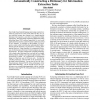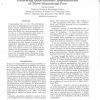AAAI
1993
14 years 29 days ago
1993
Knowledge-based natural language processing systems have achieved good success with certain tasks but they are often criticized because they depend on a domain-specific dictionar...
AAAI
1996
14 years 29 days ago
1996
Anytime algorithms offer a tradeoff between solution quality and computation time that has proved useful in applying artificial intelligence techniques to time-critical problems. ...
AAAI
1996
14 years 29 days ago
1996
Cox's well-known theorem justifying the use of probability is shown not to hold in nite domains. The counterexample also suggests that Cox's assumptions are insu cient t...
AAAI
1993
14 years 29 days ago
1993
learning (EBL) component. In this paper we provide a brief review of FOIL and FOCL, then discuss how operationalizing a domain theory can adversely affect the accuracy of a learned...
AAAI
1994
14 years 29 days ago
1994
We introduce a new framework for the study of reasoning. The Learning (in order) to Reason approach developed here views learning as an integral part of the inference process, and ...
AAAI
1996
14 years 29 days ago
1996
Wepresent our approach to agent modelingfor communication, and compareit to an approach to agent modelingfor other types of action. The comparisonshould be instructive since both ...
AAAI
1993
14 years 29 days ago
1993
In planning tasks an agent may often find himself in a situation demanding that he choose an action that would prevent some unwanted event from occurring. Similarly, in tasks invo...
AAAI
1996
14 years 29 days ago
1996
This article advocates a new model for inductive learning. Called sequential induction, it helps bridge classical fixed-sample learning techniques (which are efficient but difficu...
AAAI
1994
14 years 29 days ago
1994
We describe a bottom-up approach to the design of software agents. We built and tested an agent system that addresses the real-world problem of handling the activities involved in...
AAAI
1993
14 years 29 days ago
1993
Understanding flow in the three-dimensional phase space is challenging both to human experts and to current computer science technology. To break through the barrier, we are build...


